 Your new post is loading...
 Your new post is loading...

|
Scooped by
Gust MEES
February 15, 2018 1:02 PM
|
Prof. Gilles Cuniberti of the Research Unit in Law has been selected by the European Commission’s Directorate-General for Justice and Consumers (DG JUST) to join an expert group on the Modernisation of Judicial Cooperation in Civil and Commercial Matters.
The Expert Group will assist the Commission in assessing further needs and gaps in the current legal framework of judicial cooperation, including the preparation of a possible initiative with regard to (but not limited to) Regulation (EC) 1393/2007 on service of documents and Regulation (EC) 1206/2001 on taking of evidence.
The EU has the task to develop the European area of justice in civil matters based on principle of mutual trust and mutual recognition of judgements. The area of justice requires judicial cooperation over the borders. For this purpose, and for the proper functioning of the internal market, the EU has adopted legislation on cross-border service of judicial and extrajudicial documents and on cooperation in taking of evidence. These are crucial instruments to regulate judicial assistance in civil and commercial matters between the member states. Their common purpose is to provide an efficient framework for cross-border judicial cooperation. They have replaced the earlier international, more cumbersome system of Hague conventions between the member states. Learn more / En savoir plus / Mehr erfahren: https://www.scoop.it/t/luxembourg-europe/?&tag=University+Luxembourg

|
Scooped by
Gust MEES
February 1, 2018 2:26 PM
|
The Interdisciplinary Centre for Security, Reliability and Trust (SnT) at the University of Luxembourg has entered a collaborative research partnership with financial firm Clearstream, part of Deutsche Börse Group, and consulting firm escent. Over the next four years, a joint research project will explore how Artificial Intelligence (AI) and Natural Language Processing (NLP) can be used to simplify and standardise requirements analysis for IT projects in the financial industry. The project aims eventually to render processes more cost- and time-efficient.
In IT projects, stakeholders must clearly and precisely define user requirements to decide, with the agreement of all stakeholders, on the necessary capabilities and characteristics of a system. This task is especially laborious in the financial industry because of strict legal and regulatory provisions and the multiple stakeholders involved. The new strategic initiative, run in collaboration with escent, a consulting firm specialised in business analysis and requirements engineering, looks to automate the laborious analysis tasks present in Clearstream’s already mature IT system requirements engineering practices.
Requirements typically contain content written in both software modelling and natural descriptive languages. Reconciling the two can be a significant challenge. The objective is therefore to develop software solutions enabling analysts to consistently manipulate – and detect inconsistencies between – both types of content. Further, the project will develop tools to derive acceptance criteria – the ‘pass or fail’ conditions a system must meet in order for it to be accepted by a client – from these requirements documents.
Prof. Lionel Briand, Vice-Director of SnT, emphasised the importance of precise and consistent requirements: “Nearly 50% of budget overruns in IT projects are caused by inadequate requirements which ripple through system design and deployment. Together with our partners, we will work at the cutting edge of new technology to introduce automation to the requirements engineering process - reducing incompleteness, inconsistency, and ambiguity to a minimum - and facilitating the analysis of system compliance.” Learn more / En savoir plus / Mehr erfahren: https://www.scoop.it/t/luxembourg-europe/?&tag=AI https://www.scoop.it/t/luxembourg-europe/?&tag=University+Luxembourg

|
Scooped by
Gust MEES
January 29, 2018 10:10 AM
|

|
Scooped by
Gust MEES
January 18, 2018 6:45 AM
|
Researchers from the University of Luxembourg found a new biomarker for colorectal cancer (CRC) that might improve therapy and survival rates of patients.
Biomarkers are measurable biological indicators for a specific disease, such as changes in the amounts of certain proteins that occur in combination with certain illnesses. Such biomarkers help physicians to diagnose a condition, identify the disease stage, and determine a patient’s risk for recurrence of the disease. This supports the doctor in choosing the best-fitting treatment plan.
Improved early diagnosis
For CRC, early detection and classification is especially important, as, for example, not all Stage II patients benefit from chemotherapy. Especially identifying patients at risk for recurrence during the early course of the disease might help clinicians. However, there are still too few prognostic markers for CRC known so that too many patients still suffer needlessly from side effects of the chemotherapy without having real benefits. Learn more / En savoir plus / Mehr erfahren: https://www.scoop.it/t/luxembourg-europe/?&tag=University+Luxembourg https://www.scoop.it/t/luxembourg-europe/?&tag=Cancer

|
Scooped by
Gust MEES
January 15, 2018 5:25 PM
|
The Luxembourg Minister for Higher Education and Research, Marc Hansen, today presented the new rector of the University of Luxembourg, Stéphane Pallage, who took office on 1 January 2018 and for a five-year term.
Stéphane Pallage (49), Professor of Economics, grew up in Malmédy, Belgium, and has Belgian and Canadian nationalities. As a professor at the Université du Québec à Montréal, he worked mainly on applied macroeconomics, economic development, dynamic models of general equilibrium, international aid and the fight against child labor. From 2013 to 2017, he was Dean of the School of Management Sciences at the Université du Québec. In addition to his academic and leadership experience, Professor Pallage speaks fluent French, English and understands German.
Following the presentation of the rector, Marc Hansen on the one hand and the chairman of the governance council, Yves Elsen and the rector Stéphane Pallage on the other hand signed the new establishment contract between the State and the University of Luxembourg. For the period 2018-2021, an allocation of €766.84 million will be attributed to the University. The State allocation thus grew by €178.24 million, or 30% over the 2014-2017 period. An additional €26.4 million will be provided for the development of medical studies at the university.
In total, the state will invest €1.44 billion in research and higher education for the period from 2018 to 2021.
Learn more / En savoir plus / Mehr erfahren: https://www.scoop.it/t/luxembourg-europe/?&tag=University+Luxembourg

|
Scooped by
Gust MEES
January 11, 2018 2:39 PM
|
In Luxemburg ist Darmkrebs die zweithäufigste Krebserkrankung bei Männern und Frauen (weitere Informationen hier). Pro Jahr erkranken zirka 284 Personen, ungefähr 124 Menschen sterben an den Folgen. Bei Darmkrebs ist es besonders wichtig, die Krankheit frühzeitig zu erkennen, da eine Behandlung in einem späten Stadium deutlich weniger Erfolg versprechend ist. Insbesondere Patienten mit einem Risiko für ein Wiederauftreten der Krankheit zu erkennen, könnte für die Ärzte von großem Nutzen sein.
In dieser Hinsicht ist Forschern der Universität Luxemburg jetzt ein wichtiger Durchbruch gelungen: Sie haben einen neuen “Biomarker” für Dickdarmkrebs gefunden, der die Therapie und die Überlebenschancen von Patienten verbessern könnte. Das teilt die Universität heute mit.
Wichtiger Schritt: Bisher nur wenige Biomarker bekannt
Biomarker sind biologische Indikatoren für eine bestimmte Krankheit. Sie deuten etwa auf Veränderungen bestimmter Proteine hin, welche bei verschiedenen Krankheiten auftreten. Das erleichtert es dem Arzt, das am besten geeignete Therapiekonzept auszuwählen. Allerdings sind bisher nur wenige prognostische Marker für Darmkrebs bekannt, sodass zu viele Patienten immer noch unter den Nebenwirkungen der Chemotherapie leiden, ohne einen tatsächlichen Nutzen zu haben. Learn more / En savoir plus / Mehr erfahren: https://www.scoop.it/t/luxembourg-europe/?&tag=Research https://www.scoop.it/t/luxembourg-europe/?&tag=Cancer

|
Scooped by
Gust MEES
December 20, 2017 6:27 PM
|
A research project exploring the fight against the criminal misuse of cryptocurrencies has been granted funding by the Luxembourg National Research Fund.
The project will be led by Associate Prof. Silvia Allegrezza for a period of two years.
During this time, the project intends to contribute to the design of a coordinated European Union supervision and enforcement system to combat criminal uses of virtual currencies. Once hailed as an innovative peer-to-peer payment system, cryptocurrencies have increasingly been linked to money-laundering, fraud and trafficking in illicit goods. They pose a particular challenge in that they are designed to conceal the identity of their users, making it difficult to identify perpetrators in criminal investigations.
Since cryptocurrency services operate across national borders through the internet, the research project will focus on enhancing international cooperation and coordination to effectively detect, investigate and sanction crimes perpetrated by means of cryptocurrencies. To this end, the study will take advantage of the strategic position of Luxembourg, both as a dynamic hub for blockchain industry and cryptocurrencies markets.
The Luxembourg team of researchers will be supported by an interdisciplinary penal of eminent experts in the field from Germany, Singapore, the UK and the US.
The FNR funding was awarded through the OPEN 2017 scheme, with €437,000 awarded for the two-year project. Learn more / En savoir plus / Mehr erfahren: https://www.scoop.it/t/luxembourg-europe/?&tag=cryptocurrency https://www.scoop.it/t/luxembourg-europe/?&tag=Cybersecurity https://www.scoop.it/t/luxembourg-europe/?&tag=University+Luxembourg https://www.scoop.it/t/securite-pc-et-internet/?&tag=crypto-currency

|
Scooped by
Gust MEES
November 10, 2017 4:22 PM
|
Die Universität Luxemburg fordert wieder einmal die Schüler heraus. Bei der BICS Challenge geht es darum, zu beweisen, wie kreativ, wissenschaftlich interessiert und Informatik-affin man ist. Mitmachen können alle Schüler aus dem In- und Ausland, die zwischen 15 und 18 Jahre alt sind. Die Gewinner können sich auf zahlreiche Preise freuen, darunter ein iPad und eine Apple Watch. Learn more / En savoir plus / Mehr erfahren: https://www.scoop.it/t/luxembourg-europe/?&tag=University+Luxembourg

|
Scooped by
Gust MEES
October 23, 2017 6:00 PM
|
A decade after the University of Luxembourg teamed with the Chamber of Commerce to offer a master's degree in Entrepreneurship and Innovation, the president of the governance board highlighted the importance of attracting and keeping talent in Luxembourg.
Yves Elsen added the agreement between the two partners encourages entrepreneurship and innovation and has contributed to the development of a "favourable ecosystem to create businesses".
The university's Master in Entrepreneurship and Innovation was first introduced in 2007 and Luxembourg has also seen the rise of entrepreneurship projects such as the House of Entrepreneurship, the House of Startups, nyuko and the Luxembourg House of Financial Technology (Lhoft).
General Director of the Chamber of Commerce, Carlo Thelen, said the partnership for the master programme was in line with the chamber's mission to encourage and promote entrepreneurship, which he described as "a powerful vector contributing to the socio-economic development and competitiveness of the country". Learn more / En savoir plus / Mehr erfahren: http://www.scoop.it/t/luxembourg-europe/?&tag=University+Luxembourg http://www.scoop.it/t/luxembourg-europe/?&tag=Entrepreneurship

|
Scooped by
Gust MEES
October 11, 2017 12:12 PM
|
Exzellente End-to-End-Verschlüsselungsmethoden für Messaging-Dienste gibt es schon länger. Doch was ist, wenn ein Angreifer das Gerät knackt?
Nach Edward Snowdens Enthüllungen zu Massenüberwachungen durch Behörden ist jetzt für viele Messaging-Dienstleistungen wie Facebooks WhatsApp eine "End-to-End-Verschlüsselung" verfügbar. Diese Technik stellt sicher, dass nur Sender und Empfänger die Nachricht lesen können. Doch auch diese Technik weist Sicherheitslücken auf.
Dr. Jiangshan Yu von der Universität Luxemburg hat nun eine Lösung für ein lange bekanntes Problem im Bereich der End-to-End-Verschlüsselung gefunden: Mit gegenwärtigen End-to-End-Verschlüsselungsmethoden kann ein Angreifer, sobald er einmal Zugriff auf das Gerät erlangt hat, alle künftigen Nachrichten abfangen, lesen und verändern, ohne dass Sender oder Empfänger dies je bemerken.
Die Lösung, die Dr. Yu in Zusammenarbeit mit Prof. Mark Ryan (University of Birmingham) und Prof. Cas Cremers (University of Oxford) entwickelt hat, bietet eine zusätzliche Sicherheitsebene. Sie zwingt Angreifer, Spuren zu hinterlassen, und warnt so den Nutzer. Learn more / En savoir plus / Mehr erfahren: http://www.scoop.it/t/luxembourg-europe/?&tag=University+Luxembourg http://www.scoop.it/t/securite-pc-et-internet/?&tag=ENCRYPTION

|
Scooped by
Gust MEES
October 9, 2017 8:56 AM
|
A self-service system allows you to borrow or return books on your own and to directly pick-up your reserved items. What services?
A self-service system allows you to borrow or return books on your own and to directly pick-up your reserved items.
Self-Service Machine
The self-service machines allow you to borrow books independently and at any time during opening hours.
Access to Reserved Books Books reserved via a-z.lu will be made accessible on special shelves. With the help of the self-service machine, you can check them out of the library yourself. Learn more / En savoir plus / Mehr erfahren: http://www.scoop.it/t/luxembourg-europe/?&tag=University+Luxembourg

|
Scooped by
Gust MEES
October 4, 2017 11:10 AM
|
Did you know that the Luxembourg Centre for Systems Biomedicine at the University of Luxembourg is now member of the European ELIXIR network? This initiative makes research from all of its members available to the other members, thereby fostering scientific exchange. http://ow.ly/DAvg30fDtTh On 7 September 2017, Luxembourg joined 20 other European countries in the ELIXIR (European Life Sciences Infrastructure for Biological Information) network, a network in which life science research data are shared and made available on the Internet in the long term. Learn more / En savoir plus / Mehr erfahren: http://www.scoop.it/t/luxembourg-europe/?&tag=ELIXIR

|
Scooped by
Gust MEES
September 26, 2017 6:05 AM
|
We’re positively beaming. By becoming associate members of Hyperledger, an open-source collaborative consortium dedicated to enhancing Blockchain technology, we’ve effectively laid a milestone. Indeed, the University of Luxembourg is the first (and only university, yet!) to join this international community of innovators.
“Blockchain continues to gain traction with its potential to impact global businesses by increasing efficiency and solving problems associated with transparency and information sharing,” says Brian Behlendorf, Executive Director, Hyperledger. “At Hyperledger, we're seeing this firsthand as more and more diverse organisations across industry sectors like the University of Luxembourg invest their energy and resources in understanding how blockchain technology can strengthen their own business processes."
Hosted at the Linux Foundation, Hyperledger is an open-source, not-for-profit community accelerating the development and adoption of business blockchain technologies. The Hyperledger consortium already includes leading companies such as IBM, Airbus, SAP, Fujitsu, Deutsche Börse, and over 80 additional members.
SnT researchers are a driving force of the FinTech revolution in Luxembourg. And our partnership with Hyperledger hints that we’re onto something. SnT director Björn Ottersten confirms: Learn more / En savoir plus /Mehr erfahren: http://www.scoop.it/t/luxembourg-europe/?&tag=University+Luxembourg http://www.scoop.it/t/luxembourg-europe/?&tag=Blockchain http://www.scoop.it/t/luxembourg-europe/?tag=Digital+L%C3%ABtzebuerg
|

|
Scooped by
Gust MEES
February 12, 2018 9:25 AM
|
Die Idee ist zu gut: Altes Plastik schreddern, einen 3-D-Drucker damit füttern – und etwas ganz Neues drucken. Claude Wolf, der angehende Maschinenbau-Ingenieure an der Universität Luxemburg unterrichtet, hat sie gemeinsam mit dem Technoport FabLab und dem EcoInnovation Cluster von Luxinnovation umgesetzt, unterstützt vom „Fonds National de la Recherche“. Vor gut einem Jahr ging das als Projekt „Fused Deposition Modeling“ (FDM) durch die Presse. Seither ist es still geworden. Warum? „Das Projekt wurde eigentlich zur Sensibilisierung der Studenten für Recycling und ‚Circular Economy‘ durchgeführt. Aber es gab auch das Ziel, die Ausbildungswege der Universität klarer und bekannter zu machen. Alle diese Ziele wurden erreicht“, meint Wolf. Er hat mit seinen Studenten sowohl den Schredder als auch den 3-D-Drucker entwickelt. „Wir haben das auf mehreren Messen und in Lyzeen gezeigt. Was wir aber sehen, ist ein echtes Interesse der Studenten, 3-D zu drucken und zu recyceln.“ Gerade die Generation Z sei interessiert an Projekten, hinter denen auch ein Sinn steht, hat er beobachtet.
Es wäre angesichts der Idee nur normal, wenn sie auch genutzt würde. Doch bislang gibt es keinen industriellen Partner. „Wir haben zu wenig Mittel und zu wenig Zeit“, bedauert Wolf, der die meiste Zeit mit dem Unterricht verbringt. Er hatte Kontakt mit dem Unternehmen Husky, das unter anderem PET-Flaschen herstellt. Husky stellt ihm verschiedene Polymere für Tests zur Verfügung. „Aber wir sind noch nicht auf industriellem Niveau“, bedauert der Wissenschaftler. Auch mit französischen Unternehmen hatte er Kontakt, ohne dass es zu einer Übernahme der Idee kam. „Dabei könnte es wirklich interessant sein“, ist Wolf überzeugt.
Deshalb hat er sowohl die Pläne für die Maschine als auch die Möglichkeiten als „Open Source“ gratis im Internet zur Verfügung gestellt. So könnte es doch noch zu einer industriellen Nutzung kommen.
Learn more / En savoir plus / Mehr erfahren: https://www.scoop.it/t/luxembourg-europe/?&tag=University+Luxembourg https://www.scoop.it/t/luxembourg-europe/?&tag=3D

|
Scooped by
Gust MEES
January 31, 2018 1:53 PM
|
On Monday 29 January 2018, the Luxembourg Centre for Contemporary and Digital History (C²DH) and the Luxembourg Ministry of Justice signed an agreement to launch a research project that will explore more than 200 years of the history of justice in Luxembourg.
At a press conference, Minister of Justice Félix Braz, C²DH Director Prof. Andreas Fickers and project manager Prof. Denis Scuto, together with the associated partners, presented an overview of this four-year project, which will be carried out in close cooperation with the Luxembourg National Archives. Learn more / En savoir plus / Mehr erfahren: https://www.scoop.it/t/luxembourg-europe/?&tag=Laws http://www.scoop.it/t/luxembourg-europe/?&tag=History https://www.scoop.it/t/luxembourg-europe/?&tag=University+Luxembourg

|
Scooped by
Gust MEES
January 25, 2018 2:29 PM
|
Création d’un réseau de centres de langues dans la Grande Région
Publié le jeudi, 25 janvier 2018
L’Université du Luxembourg a coordonné la mise en place d’un réseau commun d’apprentissage de langues en ligne - un nouveau projet réunissant les Centres de langues des six universités de la Grande Région (universités du Luxembourg, de Kaiserslautern, de Liège, de Lorraine, de Sarre et de Trèves).
L’offre s’adresse à tous les étudiants des universités de l’Université de la Grande Région (UniGR) souhaitant faire un semestre d’échange en zone germanophone ou francophone, ainsi qu’à tout étudiant extérieur à la Grande Région qui viendrait faire son échange dans une des six universités de l’UniGR.
Un système structuré d’apprentissage des langues
La formation se compose de deux modes d’accompagnement. Avant leur départ, les futurs étudiants d’échange seront virtuellement connectés entre eux via la plateforme Moodle. Ainsi, ils pourront échanger des informations et pratiquer la langue cible. D’autre part, sur cette même plateforme, ils participeront à un parcours pédagogique réparti en cinq thématiques visant à leur donner des informations-clefs sur leur université d’accueil (étapes administratives, vie en société et vie académique) et à préparer leur échange.
Le semestre à l’étranger sera encadré par deux retraites de deux jours chacune. À ces occasions, les étudiants pourront faire le bilan sur ce qu’ils ont retenu du parcours pédagogique, de leur échange et déclencher une réflexion sur les manières d’étudier d’un site à l’autre.
Le centre virtuel a été ouvert le 1er octobre 2017, et une première phase pilote du parcours pédagogique s’effectuera à partir du 15 avril jusqu’en juillet 2018 avec des étudiants des universités de Trèves et Liège. La plateforme pédagogique sera opérationnelle pour l’ensemble des étudiants candidats en octobre 2018. Les inscriptions pour la première retraite en janvier 2019 peut s’effectuer via un des centres de langues de la Grande Région.
Learn more / En savoir plus / Mehr erfahren: https://www.scoop.it/t/luxembourg-europe/?&tag=University+Luxembourg

|
Scooped by
Gust MEES
January 18, 2018 6:21 AM
|
Huit «domaines d’excellence» prioritaires
Sujette à d’âpres négociations durant l’année 2017, la «stratégie de recherche, d’enseignement et d’action» de l’Uni est enfin dévoilée dans l’annexe au contrat d’établissement. Une stratégie qui s’appuie sur les résultats de l’évaluation externe subie par l’Uni en 2016, et qui dégage huit «domaines d’excellence» identifiés comme les «priorités du plan quadriennal»: sciences des matériaux, informatique et sécurité des TIC, droit européen et international, finance et innovation en finance, éducation, histoire numérique et contemporaine, santé et biologie des systèmes et modélisations et simulations numériques.
En interne, l’Uni vise également à revoir les méthodes d’enseignement et d’apprentissage, y compris en valorisant l’apprentissage tout au long de la vie. Elle se donne pour objectif de «développer une administration efficiente et transparente», partant du constat que la «prise de décision académique et administrative» doit être plus efficace.
Le contrat évoque encore le développement d’une plateforme nationale pour les questions du genre (formation aux fonctions de direction, accompagnement des couples de chercheurs et politiques plus favorables aux familles). Une plateforme partagée avec le Fonds national de la recherche et les centres de recherche publics, comprenant une «optimisation des ressources dans les domaines d’intérêt commun».
L’Université reconnaît que ce plan quadriennal est d’une grande ambition.
Université du Luxembourg
Learn more / En savoir plus / Mehr erfahren: https://www.scoop.it/t/luxembourg-europe/?&tag=University+Luxembourg

|
Scooped by
Gust MEES
January 15, 2018 1:28 PM
|
Mit gleich zwei Auftritten hat sich der neue Rektor der Uni Luxemburg, der Belgo-Kanadier Stéphane Pallage, gestern den Luxemburgern vorgestellt. Vor 800 Studenten und Professoren hielt er am Vormittag seine Antrittsrede in Belval, am Nachmittag stellte er sich den Fragen der Presse.
“Ich war in Montreal sehr glücklich, ich habe meine Arbeit geliebt und hatte nicht die Absicht, wegzugehen. Kanada ist sehr international und vereint die guten Qualitäten der amerikanischen und der europäischen Forschung und Lehre. Der Posten in Luxemburg hat mich jedoch gereizt. Es ist eine beeindruckende Herausforderung, eine erst 15 Jahre alte Uni in ihre Zukunft zu führen und somit aus einer Start-up eine Weltklasse-Universität zu machen.”
“Die Regierung wollte eine gute Uni und hat ihr deshalb genügend Mittel gegeben, um sich zu entfalten”, führte der neue Mann an ihrer Spitze weiter aus. Die elfte Stelle im Ranking der Universitäten, die weniger als 50 Jahre alt sind, sei eine gute Voraussetzung auf dem Weg, aus ihr eine der besten der Welt zu machen. “Danke für das Vertrauen”, sagte er an den zuständigen Minister Marc Hansen gewandt. Dieser hatte bei der Vorstellung des neuen Rektors der Uni Luxemburg zwei Fakten hervorgehoben. Er verwies zuerst auf die Schnelligkeit, mit der die Nachfolge von Rainer Klump (der im Mai 2017 zurückgetreten war) geregelt wurde, betonte aber auch die veränderten Bedingungen bei der Suche nach einem neuen Rektor. Verantwortlich war nämlich ein eigens geschaffenes “Rekrutierungskomitee” in dem, unter der Leitung von Yves Elsen, vier Mitglieder des “Conseil de gouvernance” und vier akademische Experten, sowie ein Vertreter der Studenten, ein Mitglied der Lehrkörperschaft und ein Forscher aus einem angegliederten Forschungszentrum vertreten waren. Beamten aus dem Hochschulministerium oder ein Regierungskommissar waren nicht in die Suche impliziert. Learn more / En savoir plus / Mehr erfahren: https://www.scoop.it/t/luxembourg-europe/?&tag=University+Luxembourg

|
Scooped by
Gust MEES
January 1, 2018 8:17 AM
|
The latest Startup Weekend Luxembourg, hosted at Technoport between 24-26 November, reserved a joyful surprise for two groups of the University of Luxembourg students who are passionate about entrepreneurship and delivered an impressive outcome in this competition.
Featured Image (from left to right): Isaak Eriksson, Joni Beu, Himadri Pathak, Prasad Rao Bikkineni, Mike Perreira Gonçalves / Image Credit: Antony Martini)
Their projects CheckMath (a math app enabling sustainable learning) and Hire Students (a job placement concept for students in Luxembourg) convinced the jury and were listed 1st and 4th of 12 innovative startup projects. This victory was all the more impressive as the student groups competed with many participants with rich professional experience.
Part of their winning formula was attributed to attending the Ideation Camp of the newly created Entrepreneurship Program of the University in October. Learn more / En savoir plus / Mehr erfahren: https://www.scoop.it/t/luxembourg-europe/?&tag=StartUps https://www.scoop.it/t/luxembourg-europe/?&tag=University+Luxembourg

|
Scooped by
Gust MEES
November 23, 2017 9:44 AM
|
Intel Corporation has signed a Partnership Framework Agreement, joining forces with the University of Luxembourg’s Interdisciplinary Centre for Security, Reliability and Trust (SnT). As autonomous vehicles gain in complexity, it becomes increasingly difficult to secure them against hackers.
Through this agreement, SnT and Intel will therefore work together to make such vehicles more resilient, allowing them to neutralise attacks automatically, and even ‘self-heal’ before an attacker can compromise too many essential functions.
The agreement follows SnT’s involvement in the Intel Collaborative Research Institute for Collaborative Autonomous & Resilient Systems (ICRI-CARS), with the work being carried out by researchers from SnT’s Critical and Extreme Security and Dependability Research Group (CritiX). Their research will focus in particular on solving security issues impacting safety, caused, for example, by the need for self-driving cars to ‘collaborate' with one another. Learn more / En savoir plus / Mehr erfahren: https://www.scoop.it/t/luxembourg-europe/?&tag=SnT https://www.scoop.it/t/luxembourg-europe/?&tag=University+Luxembourg

|
Scooped by
Gust MEES
November 7, 2017 3:58 PM
|
Prof. Ines Thiele, researcher at the Luxembourg Centre for Systems Biomedicine (LCSB) at the University of Luxembourg has been selected for the highly prestigious research funding of the European Research Council (ERC).
The head of the LCSB group “Molecular Systems Physiology” and ATTRCT fellow of the Luxembourg National Research Fund (FNR) has been awarded an “ERC Starting Grant” for her project “Bug the Drug”. Ines Thiele’s project is to develop novel computer models that will assist in the personalisation of drugs used in cancer therapy or for treating Parkinson’s disease, so that the best drug for each individual patient can be prescribed. The basis for the models will be data on the patients’ dietary habits and the composition of their bacterial gut flora. This should help to reduce side effects and intolerances. The distinguished project will be funded with 1.6 million euros over a period of five years. Learn more / En savoir plus / Mehr erfahren: http://www.scoop.it/t/luxembourg-europe/?&tag=University+Luxembourg http://www.scoop.it/t/luxembourg-europe/?&tag=ERC

|
Scooped by
Gust MEES
October 13, 2017 12:30 PM
|
Die Universität bedeute für die Region ein fantastischer Zugewinn schlauer Menschen (“Braingain”), da Studenten oft an ihrem Studienort sesshaft und geschäftig würden. Über die Zukunft sprach auch Gastrednerin Professorin Kristín Ingólsdóttir von der Universität von Island. 65 Prozent der Kinder, die heute zur Schule gehen, würden irgendwann einen Beruf ausüben, den es heute noch nicht gibt, erklärte die Akademikerin. Dies stellt laut der Forscherin die Gesellschaft vor neue Aufgaben. Die Menschen haben heute schon andere Bedürfnisse als früher.
Im kleinen Kreis von Politikern, Akademikern und einer Blaskapelle wurde das neue akademische Jahr eingeläutet.
In der Zukunft werden auch andere Fähigkeiten von den Menschen verlangt. Neue “Skills” also. Wohlgemerkt in einer Zukunft, in der Maschinen den Menschen nicht nur an der Werkbank ablösen. So müssen die Menschen künftig eine profunde Kenntnis für Informatik haben. Sie müssen nicht nur mit einem Computer umgehen können, sondern ein Verständnis für Algorithmen haben. Außerdem müssen sie anpassungsfähig sein, d.h. sie müssen sich ein Leben lang fortbilden. Außerdem wird von ihnen kritisches Denken und das “Jonglieren” mit komplexen Problemen verlangt. Learn more / En savoir plus / Mehr erfahren: http://www.scoop.it/t/luxembourg-europe/?&tag=University+Luxembourg

|
Scooped by
Gust MEES
October 10, 2017 2:29 PM
|
Following Edward Snowden’s revelations about government mass surveillance, end-to-end encryption is now widely available through services such as Facebook’s WhatsApp. The technique ensures that only sender and recipient can read a message.
Dr Jiangshan Yu at the University of Luxembourg has developed a solution to a longstanding problem in the field of end-to-end encryption: With current end-to-end encryption methods, if an attacker compromises a recipient’s device he can then intercept, read and alter all future communications without sender or recipient ever knowing. Dr Yu’s solution, developed in collaboration with Prof. Mark Ryan (University of Birmingham) and Prof. Cas Cremers (University of Oxford), adds an extra layer of security, forcing attackers to leave evidence of any such activity and prompting users to take action. Learn more / En savoir plus / Mehr erfahren: http://www.scoop.it/t/luxembourg-europe/?&tag=University+Luxembourg http://www.scoop.it/t/securite-pc-et-internet/?&tag=ENCRYPTION

|
Scooped by
Gust MEES
October 5, 2017 11:30 AM
|
Um intelligente Verkehrssysteme zu entwickeln, braucht man ein realistisches Verkehrsszenario. Ein solches wurde an der Uni Luxemburg entwickelt.
Luxemburg gehört weltweit zu den Ländern mit der höchsten Verkehrsdichte. Im Schnitt haben zwei von drei Luxemburgern ein Auto - was einem vor allem dann bewusst wird, wenn man als Autofahrer in einem der unzähligen Staus steht. Zwar arbeiten Forscher, Planer und Arbeitsgemeinschaften aus allen möglichen Bereichen daran, die Verkehrssituation in den Ballungsgebieten zu verbessern. Doch was ihnen meist fehlt, ist ein möglichst realitätsnahes Verkehrsszenario.
„Der Verkehr ist ein sehr komplexes System, weshalb es schwierig ist, ihn zu simulieren“, sagt Lara Codeca. Die junge Forscherin hat sich im Rahmen ihrer Doktorarbeit am Interdisciplinary Centre for Security, Reliability and Trust (SnT) der Uni Luxemburg mit diesem Problem befasst. Auf Grundlage der Open-Source Software SUMO (Simulation of Urban Mobility) hat sie ein Szenario entwickelt, das in der Lage ist, den Verkehr über den gesamten Tagesverlauf realistisch darzustellen.
Learn more / En savoir plus / Mehr erfahren: http://www.scoop.it/t/luxembourg-europe/?&tag=Research http://www.scoop.it/t/luxembourg-europe/?&tag=University+Luxembourg

|
Scooped by
Gust MEES
September 27, 2017 2:14 PM
|
Uns Menschen besiedeln genauso viele Bakterien, wie wir Körperzellen haben. Doch das schadet uns nicht! Wie profitieren wir von diesen Untermietern? Frau Fritz, Sie erforschen Bakterien die den Menschen besiedeln. Sind diese gefährlich? Im Gegenteil: das sogenannte Mikrobiom – die Gesamtheit aller den Menschen besiedelnden Mikroben – ist, wenn im Gleichgewicht, sogar sehr nützlich für den Menschen. Wie können Bakterien uns nützen?Zwischen den Bakterien und den menschlichen Zellen gibt es ein Wechselspiel. Denken Sie etwa an den Darm, in dem sehr viele Bakterien leben – ohne diese könnten wir viele Mahlzeiten gar nicht verdauen. Sie bauen Moleküle ab die wir essen und produzieren andere Moleküle, die wir etwa für das Immunsystem benötigen. Wenn man im Tierversuch Mäuse züchtet, die ohne Bakterien leben müssen, sind sie zwar lebensfähig, haben aber ein schwächeres Immunsystem und sind viel dünner. Sie helfen uns also bei der Verdauung…Ja, aber nicht nur das. Inzwischen findet man auch Zusammenhänge zwischen dem Mikrobiom und verschiedensten Krankheiten. Allerdings wissen wir oft nicht, ob ein gestörtes Mikrobiom ein Auslöser der Krankheit ist, oder umgekehrt eine Krankheit sich negativ auf das natürliche Mikrobiom auswirkt. Learn more / En savoir plus / Mehr erfahren: http://www.scoop.it/t/luxembourg-europe/?&tag=University+Luxembourg http://www.scoop.it/t/luxembourg-europe/?&tag=Microbiome http://www.scoop.it/t/luxembourg-europe/?&tag=Parkinson
|



 Your new post is loading...
Your new post is loading...

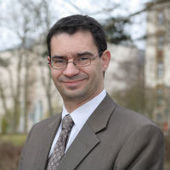


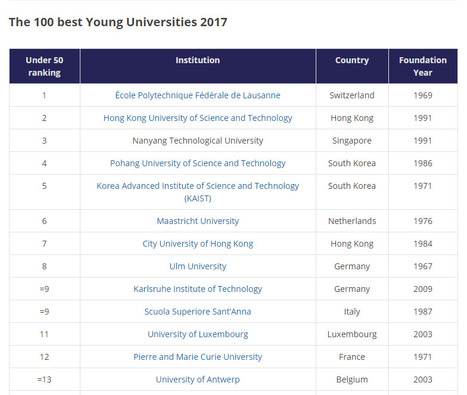
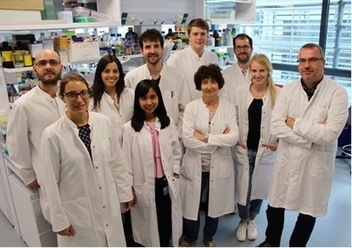
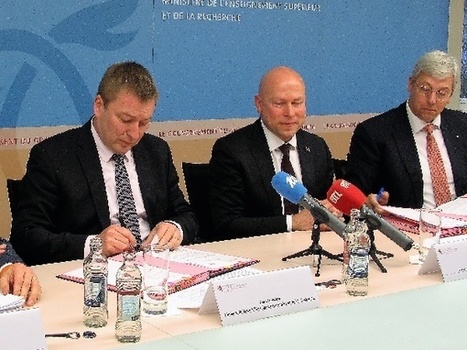
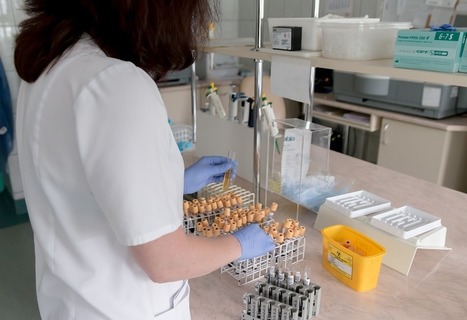



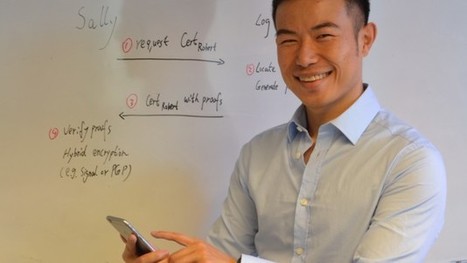



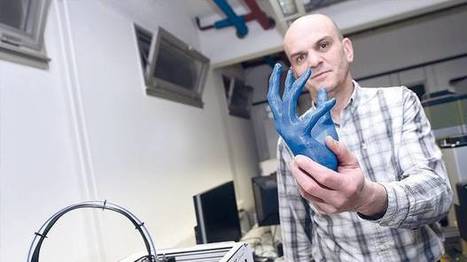
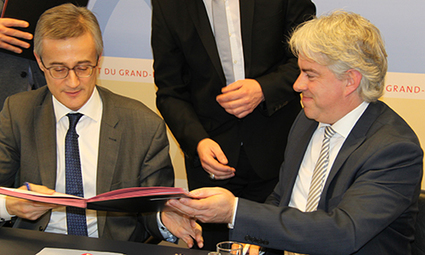



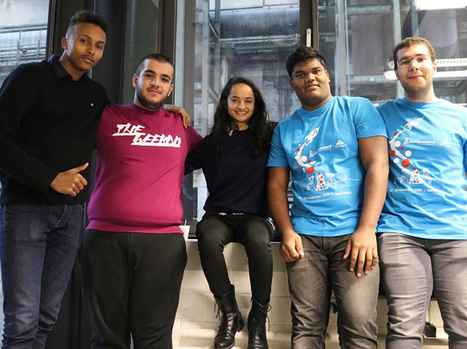

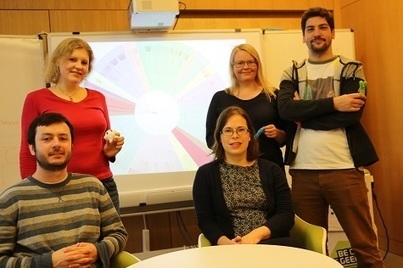
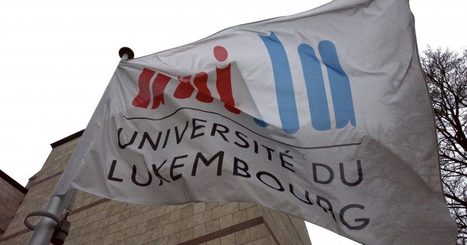


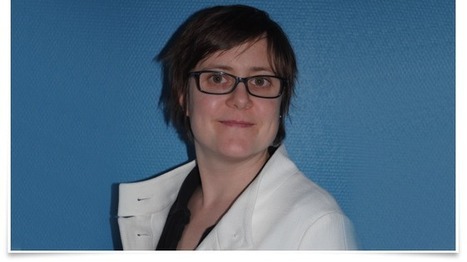





These are crucial instruments to regulate judicial assistance in civil and commercial matters between the member states. Their common purpose is to provide an efficient framework for cross-border judicial cooperation. They have replaced the earlier international, more cumbersome system of Hague conventions between the member states.
Learn more / En savoir plus / Mehr erfahren:
https://www.scoop.it/t/luxembourg-europe/?&tag=University+Luxembourg